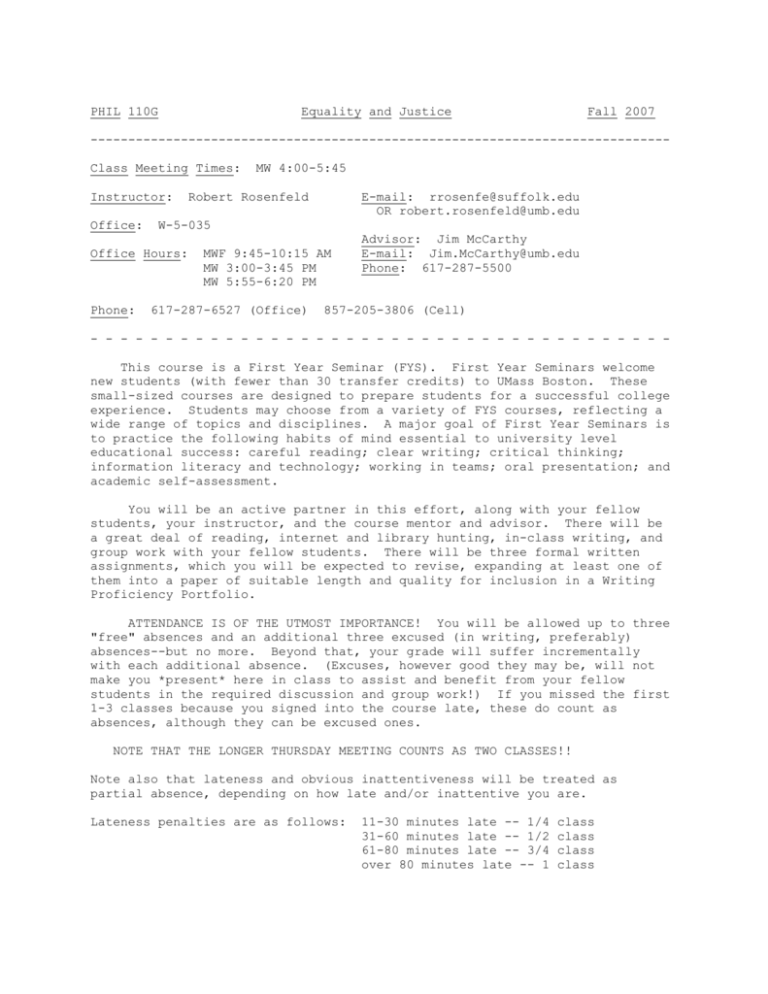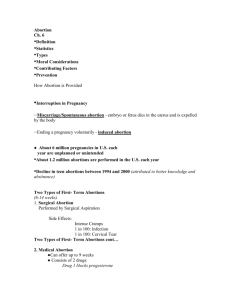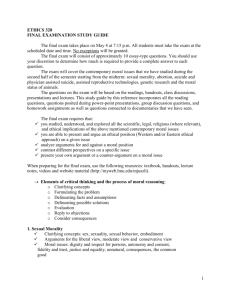PHIL G110 Equality and Justice Spring 2005
advertisement

PHIL 110G Equality and Justice Fall 2007 ----------------------------------------------------------------------------Class Meeting Times: Instructor: Office: Robert Rosenfeld E-mail: rrosenfe@suffolk.edu OR robert.rosenfeld@umb.edu W-5-035 Office Hours: Phone: MW 4:00-5:45 MWF 9:45-10:15 AM MW 3:00-3:45 PM MW 5:55-6:20 PM 617-287-6527 (Office) Advisor: Jim McCarthy E-mail: Jim.McCarthy@umb.edu Phone: 617-287-5500 857-205-3806 (Cell) - - - - - - - - - - - - - - - - - - - - - - - - - - - - - - - - - - - - - - This course is a First Year Seminar (FYS). First Year Seminars welcome new students (with fewer than 30 transfer credits) to UMass Boston. These small-sized courses are designed to prepare students for a successful college experience. Students may choose from a variety of FYS courses, reflecting a wide range of topics and disciplines. A major goal of First Year Seminars is to practice the following habits of mind essential to university level educational success: careful reading; clear writing; critical thinking; information literacy and technology; working in teams; oral presentation; and academic self-assessment. You will be an active partner in this effort, along with your fellow students, your instructor, and the course mentor and advisor. There will be a great deal of reading, internet and library hunting, in-class writing, and group work with your fellow students. There will be three formal written assignments, which you will be expected to revise, expanding at least one of them into a paper of suitable length and quality for inclusion in a Writing Proficiency Portfolio. ATTENDANCE IS OF THE UTMOST IMPORTANCE! You will be allowed up to three "free" absences and an additional three excused (in writing, preferably) absences--but no more. Beyond that, your grade will suffer incrementally with each additional absence. (Excuses, however good they may be, will not make you *present* here in class to assist and benefit from your fellow students in the required discussion and group work!) If you missed the first 1-3 classes because you signed into the course late, these do count as absences, although they can be excused ones. NOTE THAT THE LONGER THURSDAY MEETING COUNTS AS TWO CLASSES!! Note also that lateness and obvious inattentiveness will be treated as partial absence, depending on how late and/or inattentive you are. Lateness penalties are as follows: 11-30 minutes late -- 1/4 31-60 minutes late -- 1/2 61-80 minutes late -- 3/4 over 80 minutes late -- 1 class class class class All First Year Seminars meet 4 hours per week and carry 4 credits. A mentor and a staff academic advisor are ordinarily assigned to each seminar. Among other things, the mentor can help you with computer accounts, e-mail, and with library research. The advisor will visit the class once or twice during the semester, and can be contacted for help with choosing courses and major, with financial aid, and any problems with university life in general. UMass Boston is a wonderfully diverse community. We hope that you will take advantage of the opportunity to learn about the rich array of opinions and experiences that will inevitably be present in this class. If you entered UMB with 30 or more transferable credits, you should not be enrolled in this course. If you entered UMB with fewer than 30 credits but have more than 30 credits now, you still need a First Year Seminar (a G100 or 100G course, like this one) if you have not yet taken one. Note: If you have taken another G100- or 100G-level course in any department at UMB, you cannot receive credit for this one. Please note also that courses taken at UMass Boston before matriculating do not count as transfer credits. Thus, for example, if you took 36 UMass Boston credits as a special student and then applied for admission, you still need to take a First Year Seminar. Student Referral Program: If it appears to the teacher that you might not pass this First Year Seminar, and if the instructor cannot figure out how to support your success in the course, the instructor might inform the director of the Student Referral Program (CC-1100;287-5500). The staff in this program will attempt to help you address the difficulties that are interfering with your success in the class. If you do not want your instructor to let the Student Referral Program know that you are having difficulty, please let your instructor know. Accommodations: Section 504 of the Americans with Disabilities Act of 1990 offers guidelines for curriculum modifications and adaptations for students with documented disabilities. If applicable, students may obtain adaptation recommendations from the Ross Center for Disability Services, CC 2-2100, (617-287-7430). If this applies to you, you must present these recommendations to each professor within a reasonable period, preferably by the end of the Add/Drop period. Student Conduct: Students are required to adhere to university policies on academic honesty and student conduct. The current Code of Student Conduct, including information about academic dishonesty is available online at: http://www.umb.edu/academics/undergraduate/office/students/CodeofStudent Conduct.html. Assessment of these Courses: In addition to a Student Self Assessment form to be completed at the end of each First Year Seminar, an assessment committee will look at randomly chosen student writing from First Year Seminars. Please save all your writing in this course so that if you are randomly chosen you will have your work available. The purpose of this is to improve the program and to improve particular courses, as necessary. You may remove your name from your papers if you choose to submit them anonymously. Your professor will let you know later in the semester whether your portfolio has been selected. - - - - - - - - - - - - - - - - - - - - - - - - - - - - - - - - - - - - - - - Schedule, Topics, and Readings: The content of this course will emphasize issues of moral equality, moral "inclusion" and justice, and the major kinds of moral reasoning involved in these issues. The topics will progress approximately as follows: Weeks 1-4 (1/28-2/20): Oppression and Inequality We will be reading several articles on the subject of racial, ethnic and gender oppression. We will learn to recognize and define key concepts that help unify the accounts of the authors involved. Groups will discuss and analyze the relationships between these concepts as presented by the authors. Each group, focusing on one article (or part thereof), will share the results of their discussion with the class as a whole. In addition, students will seek out at least one short article, column or letter from an outside source, such as the library, the internet, or a newspaper -- dealing with a selected race or gender issue, to share with the class. We will discuss at least some of these short pieces and begin learning how to evaluate them. Reading: "Oppression," by Marilyn Frye; "A Different Mirror," by Ronald Takaki; "Missing Persons and Others," by Arturo Madrid; "La Guera," by Cherrie Moraga; plus some "student-discovered" reading based on individual student searches. Formal Written Work: A short (1000-1500 words) paper on the assigned readings, showing how the authors define and illustrate oppression and other related concepts. Due Monday, February 25th. Weeks 4-6 (2/20-3/5): Moral Decision-Making and Arguments We will consider several moral dilemmas and examine the factors that influence our decisions, such as consequences, principles, and particular circumstances of the people and situations involved. We will examine what goes into a moral argument as opposed to a factual one. Groups will discuss, analyze and make recommendations on the cases, to be shared with the class as a whole. In addition, we will learn about some common fallacies in reasoning, and apply these to the abortion issue. Discussion of an article on the topic will be followed by a search of the internet for more examples of fallacies, to be written up and shared with the class. (Students who have not gotten access to or learned how to use the internet yet, will have to do so now!) Reading: Handout: Nalezinski Informal Fallacies; "Abortion and Bad Reasoning," by Alix Weeks 6-13 (3/5-4/23): Moral Inclusion and Moral Rights--The Cases of Unborn Humans and Non-Human Animals The issue of moral inclusion is that of distinguishing between beings that count morally and beings that don't. What beings must be treated with respect? What beings may be treated as objects for our use? And what determines all this? Weeks 6 to 10 will focus on the abortion debate, and weeks 10 to 13 on the status of animals. During this portion of the course, you will begin learning how to read college-level academic articles. In each 3-4-week period, four articles will be divided between work groups, each group focusing on one article. Students will be expected to at least "preread" or "skim" each article individually, but each group will engage collaboratively in reconstructing a single author's position, and identifying its strengths and weaknesses. Each group will present the results of their analysis to the class as a whole. There will be two formal presentations during this period, one for each of the two issues. Reading: (For the abortion issue:) "Why Abortion is Immoral," by Don Marquis; "Abortion and the Corruption of Mind," by Gordon Zahn; "A Defense of Abortion," by Judith Thomson; "On the Moral and Legal Status of Abortion," by Mary Anne Warren; (and for the animals issue:) "All Animals are Equal," by Peter Singer; "The Case for Animal Rights," by Tom Regan; "In Defense of the Dignity of Being Human," by Willard Gaylin; "The Case for Animal Experimentation," by Carl Cohen Formal Written Work: A short (1000-1500 wds.) or long (1600-2200 wds. and at least 5 complete pages) paper reviewing one or more of the articles on abortion. The assignment sheet will give some suggestions about how to review the article. Due Monday, April 7th. Weeks 13-16 (4/23-5/14): Social Justice and Access to Health Care One week will be devoted to the basic philosophical issues of distributive justice that lie behind the health-care debate. Students will examine theoretical articles, "prereading" all of them individually, then examining an article in more detail in a group and presenting the results to the class. The following week or two will be devoted to a discussion of factual and policy issues: What is going on? What is failing? What measures will actually work? Which ones won't? How can we tell? Students will seek articles from as many sources as possible to bring in for discussion. Work groups will take on the task of formulating a "statement of the problem" and proposed solution to the health-care crisis. Again, each group will present its findings for discussion by the entire class. Reading: "Health Care as a Right: A Refutation," by Robert Sade; "A Theory of Justice" (excerpts), by John Rawls; "Medical Individualism and the Right to Health Care," by John Arras and Andrew Jameton; plus numerous studentdiscovered readings from the library, the internet and other media Formal Written Work: A short (1000-1500 words) or long (1600-2200 words, 5+ pages) paper, taking the form of either: 1) an exposition and analysis of arguments for and/or against animal liberation; or 2) a discussion of the relative importance of individual and social responsibilities in the provision of health care. Due Friday, May 16th. - - - - - - - - - - - - - - - - - - - - - - - - - - - - - - - - - - - - - - - What will determine your grade: 15% -- Attendance. You should also be aware that excessive absence will have an adverse effect on the portions of your grade below. You cannot make them up simply by "getting the notes," and only some of the work below can be covered by "makeup" assignments. And again, lateness will be counted as partial absence, as will obvious inattention (e.g. sleeping, reading the paper, playing video games). 15% -- Class participation, in open discussion and group work. 15% -- Individual written response pieces: These are short informal writing assignments, which may be handwritten or typed (handwritten if done in class). These will consist of summaries of and/or responses to the reading assignments, responses to in-class presentations by your fellow students, quizzes on the readings, and two to four "self-assessment" exercises. Some of these (but not the self-assessments!) will be shared with your fellow students and may be revised in response to group or class discussion. Many will be "lightly-graded," meaning that an honest effort that does what the assignment asks for will receive a good score. There will be approximately ten to twenty of these response pieces. 15% -- Formal presentations: These will generally be done in teams, but each team member must present before the class. Students will be the main evaluators of the presentations. 40% -- Formal written assignments: As outlined earlier, there are three formal papers, any of which may be revised. At least one of them is to be written as, or expanded into, a longer (1600-2200 words, and at least five full pages long) paper by final exam week. Be sure to heed the warnings about plagiarism that will be given in class and on formal paper assignment sheets! - - - - - - - - - - - - - - - - - - - - - - - - - - - - - - - - -






